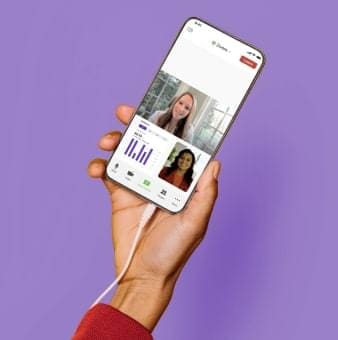Mind + body: The surprising connection between mental health and diabetes

Mental health Wellbeing
By simultaneously tackling both Type 2 diabetes and mental health, you can provide better health for your people and a better bottom line for your organization.
The CDC estimates that nearly 50% of the U.S. adult population has prediabetes or diabetes, which has a tremendous impact on the health of your workforce.1 To counteract this, benefits such as Diabetic Prevention Programs (DPPs) or diabetes-management programs can help your people prevent or properly manage Type 2 diabetes. However, point solutions such as these are missing a very important component of diabetes care: mental health support.
A resounding body of evidence shows a close connection between mental and physical health. This relationship is especially apparent when looking at the interconnection of diabetes and mental health—as both can have a negative impact on the management of the other:
- People with diabetes are 2–3X more likely to have depression than those without diabetes2
- Having depression increases the risk of developing Type 2 diabetes by 60%3
By enacting the following initiatives into your benefits strategy, you’ll increase the quality of care and decrease the impact diabetes has on your population:
1. Treat the people, not the numbers. Narrowly defined solutions that only focus on one part of the health picture, or categorize employees by their disease or risk factors, do not consider the psychological complexity of behavior change. Each individual has unique health goals, struggles, and motivations. It’s important to partner with solutions that look at the whole person.
2. Look for solutions rooted in behavior change. Though obesity is the leading contributing risk factor for the development of Type 2 diabetes, long-term weight loss is most attainable when coupled with behavior change.4 Programs based in behavioral science will best support the physical and mental well-being of your population.
3. Pair weight-loss medications with behavior change support. Weight-loss medications may be a game-changer but carry a slew of additional complications such as medication adherence, side effects, mental health concerns, and more. Choose the right behavior change program to help participants handle the challenges that come with life-changing weight loss before, during, and after medication.
4. Choose mental and physical health solutions that reinforce each other. The right partners will have a holistic approach to integrating with other solutions—you’ll want an ecosystem of different programs that can address interconnected comorbidities such as diabetes and mental well-being.
5. Don’t leave behind the undiagnosed. Ninety percent of people with prediabetes don’t know that they have it.5 Employers have the biggest opportunity to impact claims reports and an employee’s long-term quality of life before they develop a chronic condition, making prevention key.
Both mental and physical health have taken a hit over the last few years, resulting in an increase in pre-diabetes and Type 2 diabetes nationwide. By understanding and simultaneously tackling both Type 2 diabetes and mental health, you can provide better health, resiliency, and chronic disease prevention for your people and a better bottom line for your organization.
Looking for more help? Learn more about our solution, Wondr Advanced, the advanced obesity solution to help organizations navigate the complexities of obesity and weight-loss medications to optimize outcomes and control costs.
Resources
1. https://www.cdc.gov/diabetes/pdfs/data/statistics/national-diabetes-statistics-report.pdf
2. Centers for Disease Control and Prevention. (2020). Diabetes and Mental Health. https://www.cdc.gov/diabetes/managing/mental-health.html.
3.Mezuk, B., Eaton, W. W., Albrecht, S., & Golden, S. H. (2008). Depression and type 2 diabetes over the lifespan: a meta-analysis. Diabetes care, 31(12), 2383–2390. https://doi.org/10.2337/dc08-098.
4. Barnes A. S. (2011). The epidemic of obesity and diabetes: trends and treatments. Texas Heart Institute journal, 38(2), 142–144.
5. Centers for Disease Control and Prevention. (2016). Prediabetes could it be you? Retrieved 22 March 2021, from https://www.cdc.gov/diabetes/pubs/images/prediabetes-inforgraphic.jpg.





